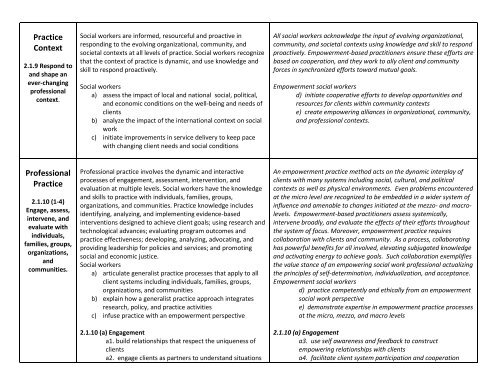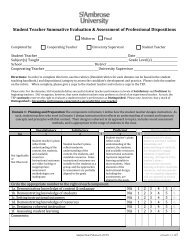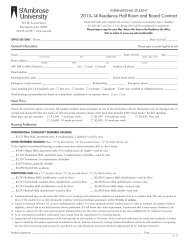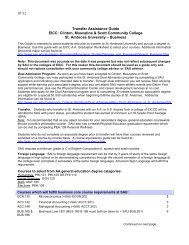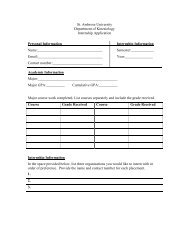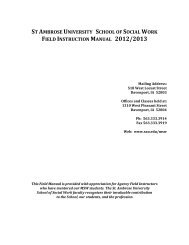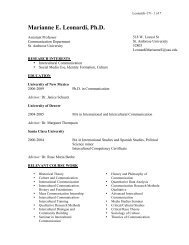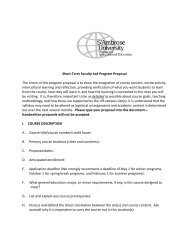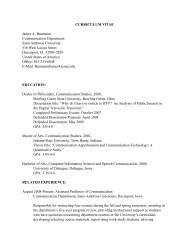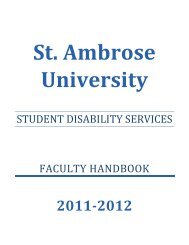Practice Behaviors and Competency Outcomes for School of Social ...
Practice Behaviors and Competency Outcomes for School of Social ...
Practice Behaviors and Competency Outcomes for School of Social ...
Create successful ePaper yourself
Turn your PDF publications into a flip-book with our unique Google optimized e-Paper software.
<strong>Practice</strong><br />
Context<br />
2.1.9 Respond to<br />
<strong>and</strong> shape an<br />
ever-changing<br />
pr<strong>of</strong>essional<br />
context.<br />
<strong>Social</strong> workers are in<strong>for</strong>med, resourceful <strong>and</strong> proactive in<br />
responding to the evolving organizational, community, <strong>and</strong><br />
societal contexts at all levels <strong>of</strong> practice. <strong>Social</strong> workers recognize<br />
that the context <strong>of</strong> practice is dynamic, <strong>and</strong> use knowledge <strong>and</strong><br />
skill to respond proactively.<br />
<strong>Social</strong> workers<br />
a) assess the impact <strong>of</strong> local <strong>and</strong> national social, political,<br />
<strong>and</strong> economic conditions on the well-being <strong>and</strong> needs <strong>of</strong><br />
clients<br />
b) analyze the impact <strong>of</strong> the international context on social<br />
work<br />
c) initiate improvements in service delivery to keep pace<br />
with changing client needs <strong>and</strong> social conditions<br />
All social workers acknowledge the input <strong>of</strong> evolving organizational,<br />
community, <strong>and</strong> societal contexts using knowledge <strong>and</strong> skill to respond<br />
proactively. Empowerment-based practitioners ensure these ef<strong>for</strong>ts are<br />
based on cooperation, <strong>and</strong> they work to ally client <strong>and</strong> community<br />
<strong>for</strong>ces in synchronized ef<strong>for</strong>ts toward mutual goals.<br />
Empowerment social workers<br />
d) initiate cooperative ef<strong>for</strong>ts to develop opportunities <strong>and</strong><br />
resources <strong>for</strong> clients within community contexts<br />
e) create empowering alliances in organizational, community,<br />
<strong>and</strong> pr<strong>of</strong>essional contexts.<br />
Pr<strong>of</strong>essional<br />
<strong>Practice</strong><br />
2.1.10 (1-4)<br />
Engage, assess,<br />
intervene, <strong>and</strong><br />
evaluate with<br />
individuals,<br />
families, groups,<br />
organizations,<br />
<strong>and</strong><br />
communities.<br />
Pr<strong>of</strong>essional practice involves the dynamic <strong>and</strong> interactive<br />
processes <strong>of</strong> engagement, assessment, intervention, <strong>and</strong><br />
evaluation at multiple levels. <strong>Social</strong> workers have the knowledge<br />
<strong>and</strong> skills to practice with individuals, families, groups,<br />
organizations, <strong>and</strong> communities. <strong>Practice</strong> knowledge includes<br />
identifying, analyzing, <strong>and</strong> implementing evidence-based<br />
interventions designed to achieve client goals; using research <strong>and</strong><br />
technological advances; evaluating program outcomes <strong>and</strong><br />
practice effectiveness; developing, analyzing, advocating, <strong>and</strong><br />
providing leadership <strong>for</strong> policies <strong>and</strong> services; <strong>and</strong> promoting<br />
social <strong>and</strong> economic justice.<br />
<strong>Social</strong> workers<br />
a) articulate generalist practice processes that apply to all<br />
client systems including individuals, families, groups,<br />
organizations, <strong>and</strong> communities<br />
b) explain how a generalist practice approach integrates<br />
research, policy, <strong>and</strong> practice activities<br />
c) infuse practice with an empowerment perspective<br />
2.1.10 (a) Engagement<br />
a1. build relationships that respect the uniqueness <strong>of</strong><br />
clients<br />
a2. engage clients as partners to underst<strong>and</strong> situations<br />
An empowerment practice method acts on the dynamic interplay <strong>of</strong><br />
clients with many systems including social, cultural, <strong>and</strong> political<br />
contexts as well as physical environments. Even problems encountered<br />
at the micro level are recognized to be embedded in a wider system <strong>of</strong><br />
influence <strong>and</strong> amenable to changes initiated at the mezzo- <strong>and</strong> macrolevels.<br />
Empowerment-based practitioners assess systemically,<br />
intervene broadly, <strong>and</strong> evaluate the effects <strong>of</strong> their ef<strong>for</strong>ts throughout<br />
the system <strong>of</strong> focus. Moreover, empowerment practice requires<br />
collaboration with clients <strong>and</strong> community. As a process, collaborating<br />
has powerful benefits <strong>for</strong> all involved, elevating subjugated knowledge<br />
<strong>and</strong> activating energy to achieve goals. Such collaboration exemplifies<br />
the value stance <strong>of</strong> an empowering social work pr<strong>of</strong>essional actualizing<br />
the principles <strong>of</strong> self-determination, individualization, <strong>and</strong> acceptance.<br />
Empowerment social workers<br />
d) practice competently <strong>and</strong> ethically from an empowerment<br />
social work perspective<br />
e) demonstrate expertise in empowerment practice processes<br />
at the micro, mezzo, <strong>and</strong> macro levels<br />
2.1.10 (a) Engagement<br />
a3. use self awareness <strong>and</strong> feedback to construct<br />
empowering relationships with clients<br />
a4. facilitate client system participation <strong>and</strong> cooperation


